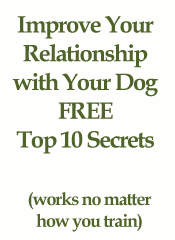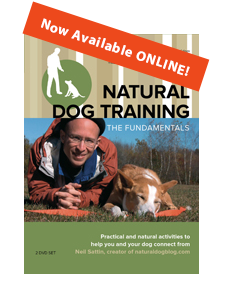The primary way our dogs experience the world is not by thinking - it is through feeling. Our dogs are like big emotional radars - picking up on the vibes that the world throws their way. While "the world" is a huge source of emotional energy, who do you think is the biggest source of stimulation in your dog's environment? If you guessed "Me!" - you're right! (As in: you are - not Neil Sattin 🙂 ). Since our dogs are constantly responding to the emotional energy that they're receiving, their behavior is often an expression of the emotions that we, ourselves, are putting out there. And since they're sensitive creatures (their whole system, after all, is attuned to the emotional frequencies of the world), the emotions that they're experiencing in us often run deep below the surface of our awareness.
As Kevin Behan talks about in his article on What Dogs are Trying to Tell You, the common approach of "fix the dog" often doesn't get to the heart of the matter when you're addressing problem behavior in your pooch. If there are seeds of anger within you, fear, nervousness - then those nuggets of feeling will be transmitted directly to the creature who feels you best - your dog. And your dog has no choice but to express those feelings - because that's what dogs do: energy in (the vibes you're putting out into the world), energy out (your dog's actions).
I have seen this happen many times with my clients, especially when there's a behavioral issue in their dog that just seems stuck. Fortunately for me, it was a part of my training with Kevin to recognize this early on, and to address the situation as openly as possible with my clients. While many (but not all) of us are adept at recognizing the emotions that are going on within us, in this day and age it has become much less acceptable for us to actually give a voice to some of those emotions: particularly anger and fear. No one wants to appear hostile, and no one wants to appear fearful or nervous. We have to be all nicey-nice with each other, because conflict is a "bad" thing. And talking about our fear makes us vulnerable - which feels especially bad if your admission of fear is negated by someone else's "oh, there's nothing to be afraid of".
The problem (and ultimately, the solution) is that those feelings are there whether you want them to be there or not. When we repress our feelings of anger and fear, we are only fooling ourselves into thinking that we've resolved those feelings - while in truth our anger and fear find OTHER ways of expressing themselves. If you have a dog (and those of you reading these words probably do), then the odds are pretty good that your dog has found a way to express these emotions for you. It's not that they're trying to solve the problem - they're just responding to the reality of the way that the world makes them feel. In other words, the emotions also aren't going to go away because your dog is expressing them. Actually, the irony is that our dogs' expression of anger or fearfulness often causes even MORE of that emotion for us. Now not only do we have our own anger/fear to deal with, but we also have our dogs' emotions to contend with as well. And no amount of "fixing your dog" is going to fix those feelings in you.
The good news is that by resolving your OWN feelings - which involves acknowledging them and giving them a voice - you are automatically resolving a good portion of those feelings for your dog. I've seen this time after time with clients, where their dog makes a measured amount of progress, but something seems to be holding the dog back from the ultimate breakthrough. As soon as the clients start looking within themselves, acknowledging the anger, stress, resentment, fear, etc. that they may be experiencing in the "trigger" situations, and allowing themselves to FEEL the full force of that emotion and express it, relax through it, the block to progress within the dog often evaporates. Sometimes just an open, honest conversation about it will be enough to get the energy moving for both dog and owner.
The more present that you can be in your interactions with others, and the world in general, the more that you will be able to keep these emotions from building up within you - preventing problems for both you and your dog. Are you experiencing conflict with a friend, a partner, members of the opposite sex, a neighbor? Do certain situations make you tense? Is your dog actually giving a voice to something that you're experiencing within yourself?
When I was in the middle of my apprenticeship (learning Natural Dog Training), I had definitely made some progress with my dog, Nola, in terms of her aggression towards strange dogs. When Kevin brought up the possibility that perhaps some emotional undercurrent in my interactions with other people was influencing Nola's behavior, I was initially skeptical. I mean, I've always been a friendly guy, and I didn't really think that I had any problems with meeting strangers. However, I acknowledged the possibility that something was going on, and I waited to see what feelings/thoughts would bubble to the surface.
Later that day I realized that, in fact, I did feel some fear/nervousness around meeting new people. At that time I also recognized that I often had a competitive attitude towards others, rather than a more cooperative approach to interactions. Did I consciously try to change any of those things? No. Just the awareness was enough, and each subsequent interaction that I had was an opportunity for me to breathe, check in with my feelings, and notice what was going on inside of me. I changed over time, simply through having more awareness about the issue. What was REALLY interesting, however, was that Nola had a major breakthrough in her ability to play with other dogs the very next day after Kevin posed the question.
Is your dog exposed to some obvious tension - like conflict between you and your partner, or anger that you feel towards a parent? Or is your dog responding to something within you that's less overt, but still present? If you find yourself telling someone "oh, my dog LOVES such-and-such" or "my dog HATES such-and-such" - try subsituting "I" for "my dog", and see if you experience any resonance with the new statement.
As you move through the world, take time to check in with yourself, your body - notice how you're physically feeling in a variety of situations. Do you notice signs of anger, fear, or nervousness as you interact with the universe? Breathe and be honest with yourself. You'll experience nothing more freeing than to acknowledge the truth of your feelings, and you'll find that this inner acknowledgement will lead to a change in your outer experience. Once you are free to express what's going on inside of you, your dog will no longer feel the need to express it for you. And you can move on to more productive things, like a good game of FetchTug, or a walk around the block with a total stranger (and their dog).
A quick shout out to free-dog-tips. They published my article about playing hide-and-seek with your dog in their October edition of the Gone to the Dogs Blog Carnival. Check it out, along with the other interesting articles that you'll find there across the spectrum of doggy information. Also, for those of you dog trainers out there, don't forget that my November edition of the "All About Dog Training" blog carnival will be coming up on the 12th. If you're interested, please submit your articles to the all about dog training blog carnival by November 9th, 2007. We also should have some guest bloggers in the month of November (perhaps even an article or two from Kevin Behan), so stay tuned! As always, thanks for stopping by, and let me know if you have any questions.





Stevie HATES it when I try to cut his nails. Well, THIS will be interesting.... 🙂
That's the spirit! Though maybe a little less literal...